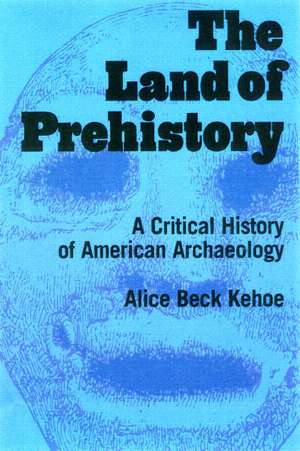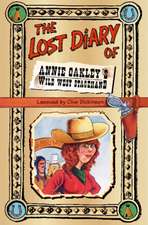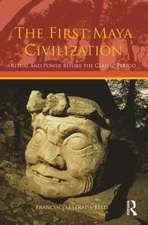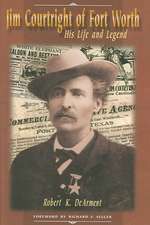The Land of Prehistory: A Critical History of American Archaeology
Autor Alice Beck Kehoeen Limba Engleză Paperback – 27 aug 1998
Preț: 494.22 lei
Nou
Puncte Express: 741
Preț estimativ în valută:
94.57€ • 99.00$ • 78.25£
94.57€ • 99.00$ • 78.25£
Carte tipărită la comandă
Livrare economică 05-19 aprilie
Preluare comenzi: 021 569.72.76
Specificații
ISBN-13: 9780415920551
ISBN-10: 0415920558
Pagini: 304
Dimensiuni: 152 x 229 x 14 mm
Greutate: 0.57 kg
Ediția:New.
Editura: Taylor & Francis
Colecția Routledge
Locul publicării:Oxford, United Kingdom
ISBN-10: 0415920558
Pagini: 304
Dimensiuni: 152 x 229 x 14 mm
Greutate: 0.57 kg
Ediția:New.
Editura: Taylor & Francis
Colecția Routledge
Locul publicării:Oxford, United Kingdom
Recenzii
"Alice Kehoe is often deliberately provocative, and this may be her most polemical publication. Do not be put off; though parts of the book are difficult, it is well worth reading... Archaeologists will want to investigate their backyards with this book. - American Anthropologist, Vol. 102, No. 3, September 2000."
"A courageous, superbly written book! ...[A]n absolute must for every interested person who would like to assess the degree of reliability, of that scenario of the prehistory of the Americas, with hich we have been infoctrinated... Such a comprehensive qualification or competence, and outlook, has today become rare, indeed, within the ranks of our Establishments, professors not expected. - Migration & Diffusion, Vol. 1, Issue No. 4, 2000."
"Kehoe's more complex and intriguing narrative focuses on what archaeologists see in the material remains of previous cultures and on what they systematically fail to see... It should be taken very seriously by fledgling archaeologists who may be more open to the reconstruction of their discipline than are they elders. ISIS. Volume 91, Number 2, June 2000 The scholarship is solid, and the prose...is often hysterically funny." -- The Key Reporter
"Kehoe succeeds in summarizing how American archaeology has come to be what it is. She is at her best in discussing developments in Britain during the late 19th century, which in many respects set the stage for what would occur in America a short time later...Graduate students and faculty." -- Choice
"Many books help us know. Alice Kehoe's helps us think as well. Feisty, passionate for truth and angry with those too lazy to pursue it, Kehoe writes with the fervor of a scholar unwilling to accept the unconsidered. The junk-yard dogs will howl, but perhaps they will awaken the neighbors to look afresh at the unconsidered preconceptions of American prehistory." -- Roger Kennedy, author of Hidden Cities, Director Emeritus of the National Museum of American History, and former Director of the National Park Service
"The scholarship is solid, and the prose...is often hysterically funny." -- The Key Reporter
"Solid scholarship, a consummate knowledge of the primary sources, and a willingness to think outside the normal boundaries of the discipline make this a book that every self-critical archaeologist must read." -- Journal of the West
"A courageous, superbly written book! ...[A]n absolute must for every interested person who would like to assess the degree of reliability, of that scenario of the prehistory of the Americas, with hich we have been infoctrinated... Such a comprehensive qualification or competence, and outlook, has today become rare, indeed, within the ranks of our Establishments, professors not expected. - Migration & Diffusion, Vol. 1, Issue No. 4, 2000."
"Kehoe's more complex and intriguing narrative focuses on what archaeologists see in the material remains of previous cultures and on what they systematically fail to see... It should be taken very seriously by fledgling archaeologists who may be more open to the reconstruction of their discipline than are they elders. ISIS. Volume 91, Number 2, June 2000 The scholarship is solid, and the prose...is often hysterically funny." -- The Key Reporter
"Kehoe succeeds in summarizing how American archaeology has come to be what it is. She is at her best in discussing developments in Britain during the late 19th century, which in many respects set the stage for what would occur in America a short time later...Graduate students and faculty." -- Choice
"Many books help us know. Alice Kehoe's helps us think as well. Feisty, passionate for truth and angry with those too lazy to pursue it, Kehoe writes with the fervor of a scholar unwilling to accept the unconsidered. The junk-yard dogs will howl, but perhaps they will awaken the neighbors to look afresh at the unconsidered preconceptions of American prehistory." -- Roger Kennedy, author of Hidden Cities, Director Emeritus of the National Museum of American History, and former Director of the National Park Service
"The scholarship is solid, and the prose...is often hysterically funny." -- The Key Reporter
"Solid scholarship, a consummate knowledge of the primary sources, and a willingness to think outside the normal boundaries of the discipline make this a book that every self-critical archaeologist must read." -- Journal of the West
Notă biografică
Alice Beck Kehoe is Professor of Anthropology at Marquette University. She is the author of Humans: An Introduction to Four-Field Anthropology (1998), published by Routledge. She has served the Society for American Archaeology as Public Relations Committee Chair and on its Public Education Task Force, and was nominated for President, Archaeology Division of the American Anthropological Association.
Cuprins
Introduction Chapter 1: The Construction of the Science of Archaeology Daniel Wilson models a science of prehistory on geology and the pre-Darwinian evolution of his mentor Robert Chambers of Edinburgh. Chapter 2: Science Boldly Predicts Behind Wilson's science of prehistory were the Scottish reformers George Combe and Robert Chambers; opposed to the Scots was the London scientific Establishment led by Sir John Lubbock. Nineteenth-century mainstream science boldy predicts. Chapter 3: Consolidating Prehistory Comparing Wilson's Prehistoric Man with Lubbock's rival volume, it is Lubbock's more purely ideological, racist statements that, coupled with his influential social position, won his Pre-historic Times its place in the Whig histories of archaeology. Chapter 4: America's History A detailed examination of Wilson's presentation of American prehistory, in which he recognizes the civilizations of American Indian nations. Chapter 5: Positivists of the New Frontier Professional American archaeology took off at the time when Turner announced that the physical frontier was at last closed, challenging Americans to go to new internal frontiers of research and economic development. American archaeology used positivist science to investigate the trans-frontier Land of Prehistory. Chapter 6: Petrified Puddle Ducks Walter Taylor's 1948 monograph acidly criticized contemporary American archaeology. Chapter 7: The New Archaeology Ten years after Taylor, Lewis Binford launched an attack on American archaeology. Carefully planned strategies and rhetoric blatantly dressing up proposals as Big Science gained National Science Foundation funding and made older archaeologists look naive. Chapter 8: The Philosophy of the New Archaeology An analysis of the much-touted philosophy of science of the New Archaeology. Chapter 9: Cahokia: Hidden in Plain Sight Mainstream American archaeologists' treatment of Cahokia, the awesome capital of an eleventh-century Midwestern state, reveals how powerfully Manifest Destiny ideology still affects American archaeology. Chapter 10: Burrowing Through the Chiefdom Lewis Henry Morgan's origin myth for American industrial capitalism is carried on through White, Service, and their students such as Timothy Earle. Chapter 11: The Taboo Topic Mainstream American archaeology absolutely refuses to discuss prehistoric contacts across salt water, even across the Gulf of Mexico. This legacy from Wilson's interpretation of American prehistory has been reinforced by Manifest Destiny ideology. Chapter 12: Land of Prehistory Postmodernists, sociologists of science, and many members of America's First Nations show little confidence in archaeologists' capacity to study the past. This final chapter outlines an approach to archaeological data that recognizes the social construction of knowledge without discounting empiricism or denigrating First Nations' own historical universes.












